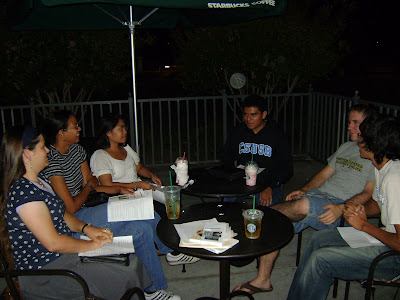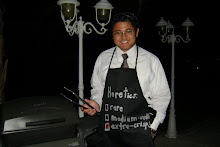
This was a good night. We were able to cover the entire lesson, except for the spiritual reading at the end. Also has some "friendly" discussion with my business competition, selling Roman Missals. Next week, the third installment. Hopefully, the final installment.
The lesson plan is printed below.
AMDG,
Laurence
Council of Starbucks
October 6, 2008
Humility, Part II
Lessons taken from: Humility - Wellspring of Virtue by Dietrich von Hildebrand (Sophia Institute Press, 1997)
“…Let nothing be done through contention, neither by vain glory: but in humility, let each esteem others better than themselves: Each one not considering the things that are his own, but those that are other men's.”~ Epistle of St. Paul to the Philippians II. 3-4, Douay-Rheims
· We have learned that: Humility is the basic building block of all the virtues and pride is the primary source of all moral evil, which is more dangerous than even concupiscence. Even things done which are intrinsically good can be robbed of its value because of pride, when one only seeks glory for himself. Satanic pride is the type of pride where the individual is scandalized by values, rejects submission to values, wishes to dethrone values, and aims to enthrone his own false values. Satanic pride rejects one’s status as a creature, and sets himself up as God.
· The person with satanic pride is “incapable of all response to value” and his blindness to value is a consequence of his pride and not the cause of it (p. 13).
· Whatever pleasure he derives from whatever puffs up his pride is unable to provide him with “genuine inner happiness” and “any blissful peace” (p. 13).
· The prideful man tends to abuse liberty since he has an idea of freedom which is disjointed from its relation to God, and its relationship to the sphere of values; this gives him an “illusion of absolute power”; freedom is thus “degraded into arbitrary license” (p. 14).
· The prideful man would resort to anything, even suicide, to prove that he has absolute liberty, divorced from any “concrete aim or value” (p. 15).
· The prideful man’s non serviam - I will not serve - is meant to challenge all forms of authority; Lucifer is the best example of this type of pride, and so was Cain (p. 15).
· Humility is an “antithesis of all metaphysical pride”, and the man who is humble is able to grasp the objective meaning of values (p. 17).
· “The inward nobility of the good, its intrinsic beauty, touches his heart and delights him… he participates in the harmony of value; his soul is bright and serene, free from the corrosive poison that eats the heart of the proud” (p. 18).
· There is also a lesser form of pride, which is less rebellious to God; this person is not blind to values and he is capable of responding to values; his life is not “spoiled through and through by disharmony” and he is capable of honest moral efforts (p. 23).
· Even though this man may be receptive to all sorts of beauty, he shuns the personal encounter with God (p. 24), again, out of his distaste for the act of subordination, which is the natural end of universal values.
· He might even surrender to a Impersonal Absolute, for this still holds on to a remnant of his “ego-sovereignty” (p. 24). It is only through a submission to a personal God where we can realize our true condition as creatures, so that we can rid ourselves of even the most minimal form of sovereignty which tends to flatter our pride.
The Imitation of ChristThomas à Kempis
Book 1, Chapter 2
HAVING A HUMBLE OPINION OF SELF
EVERY man naturally desires knowledge; but what good is knowledge without fear of God? Indeed a humble rustic who serves God is better than a proud intellectual who neglects his soul to study the course of the stars. He who knows himself well becomes mean in his own eyes and is not happy when praised by men.
If I knew all things in the world and had not charity, what would it profit me before God Who will judge me by my deeds?
Shun too great a desire for knowledge, for in it there is much fretting and delusion. Intellectuals like to appear learned and to be called wise. Yet there are many things the knowledge of which does little or no good to the soul, and he who concerns himself about other things than those which lead to salvation is very unwise.
Many words do not satisfy the soul; but a good life eases the mind and a clean conscience inspires great trust in God.
The more you know and the better you understand, the more severely will you be judged, unless your life is also the more holy. Do not be proud, therefore, because of your learning or skill. Rather, fear because of the talent given you. If you think you know many things and understand them well enough, realize at the same time that there is much you do not know. Hence, do not affect wisdom, but admit your ignorance. Why prefer yourself to anyone else when many are more learned, more cultured than you?
If you wish to learn and appreciate something worth while, then love to be unknown and considered as nothing. Truly to know and despise self is the best and most perfect counsel. To think of oneself as nothing, and always to think well and highly of others is the best and most perfect wisdom. Wherefore, if you see another sin openly or commit a serious crime, do not consider yourself better, for you do not know how long you can remain in good estate. All men are frail, but you must admit that none is more frail than yourself.
October 6, 2008
Humility, Part II
Lessons taken from: Humility - Wellspring of Virtue by Dietrich von Hildebrand (Sophia Institute Press, 1997)
“…Let nothing be done through contention, neither by vain glory: but in humility, let each esteem others better than themselves: Each one not considering the things that are his own, but those that are other men's.”~ Epistle of St. Paul to the Philippians II. 3-4, Douay-Rheims
· We have learned that: Humility is the basic building block of all the virtues and pride is the primary source of all moral evil, which is more dangerous than even concupiscence. Even things done which are intrinsically good can be robbed of its value because of pride, when one only seeks glory for himself. Satanic pride is the type of pride where the individual is scandalized by values, rejects submission to values, wishes to dethrone values, and aims to enthrone his own false values. Satanic pride rejects one’s status as a creature, and sets himself up as God.
· The person with satanic pride is “incapable of all response to value” and his blindness to value is a consequence of his pride and not the cause of it (p. 13).
· Whatever pleasure he derives from whatever puffs up his pride is unable to provide him with “genuine inner happiness” and “any blissful peace” (p. 13).
· The prideful man tends to abuse liberty since he has an idea of freedom which is disjointed from its relation to God, and its relationship to the sphere of values; this gives him an “illusion of absolute power”; freedom is thus “degraded into arbitrary license” (p. 14).
· The prideful man would resort to anything, even suicide, to prove that he has absolute liberty, divorced from any “concrete aim or value” (p. 15).
· The prideful man’s non serviam - I will not serve - is meant to challenge all forms of authority; Lucifer is the best example of this type of pride, and so was Cain (p. 15).
· Humility is an “antithesis of all metaphysical pride”, and the man who is humble is able to grasp the objective meaning of values (p. 17).
· “The inward nobility of the good, its intrinsic beauty, touches his heart and delights him… he participates in the harmony of value; his soul is bright and serene, free from the corrosive poison that eats the heart of the proud” (p. 18).
· There is also a lesser form of pride, which is less rebellious to God; this person is not blind to values and he is capable of responding to values; his life is not “spoiled through and through by disharmony” and he is capable of honest moral efforts (p. 23).
· Even though this man may be receptive to all sorts of beauty, he shuns the personal encounter with God (p. 24), again, out of his distaste for the act of subordination, which is the natural end of universal values.
· He might even surrender to a Impersonal Absolute, for this still holds on to a remnant of his “ego-sovereignty” (p. 24). It is only through a submission to a personal God where we can realize our true condition as creatures, so that we can rid ourselves of even the most minimal form of sovereignty which tends to flatter our pride.
The Imitation of ChristThomas à Kempis
Book 1, Chapter 2
HAVING A HUMBLE OPINION OF SELF
EVERY man naturally desires knowledge; but what good is knowledge without fear of God? Indeed a humble rustic who serves God is better than a proud intellectual who neglects his soul to study the course of the stars. He who knows himself well becomes mean in his own eyes and is not happy when praised by men.
If I knew all things in the world and had not charity, what would it profit me before God Who will judge me by my deeds?
Shun too great a desire for knowledge, for in it there is much fretting and delusion. Intellectuals like to appear learned and to be called wise. Yet there are many things the knowledge of which does little or no good to the soul, and he who concerns himself about other things than those which lead to salvation is very unwise.
Many words do not satisfy the soul; but a good life eases the mind and a clean conscience inspires great trust in God.
The more you know and the better you understand, the more severely will you be judged, unless your life is also the more holy. Do not be proud, therefore, because of your learning or skill. Rather, fear because of the talent given you. If you think you know many things and understand them well enough, realize at the same time that there is much you do not know. Hence, do not affect wisdom, but admit your ignorance. Why prefer yourself to anyone else when many are more learned, more cultured than you?
If you wish to learn and appreciate something worth while, then love to be unknown and considered as nothing. Truly to know and despise self is the best and most perfect counsel. To think of oneself as nothing, and always to think well and highly of others is the best and most perfect wisdom. Wherefore, if you see another sin openly or commit a serious crime, do not consider yourself better, for you do not know how long you can remain in good estate. All men are frail, but you must admit that none is more frail than yourself.

